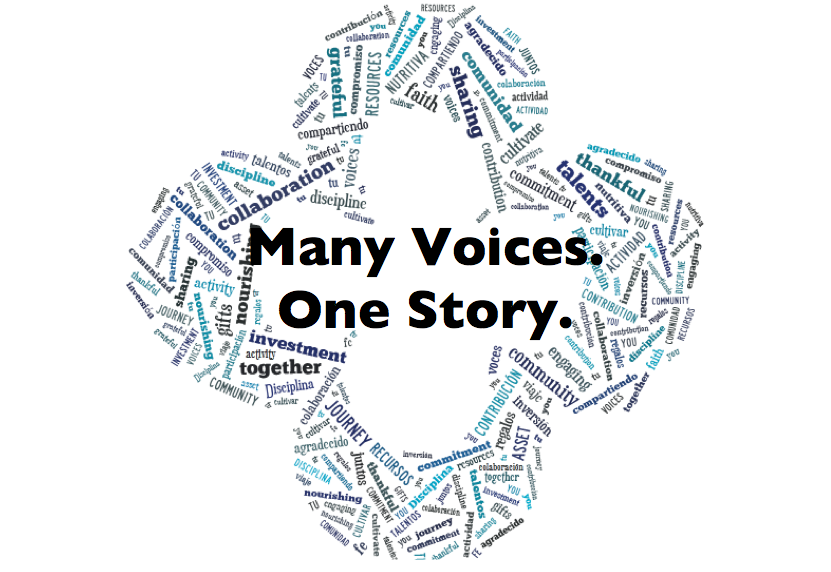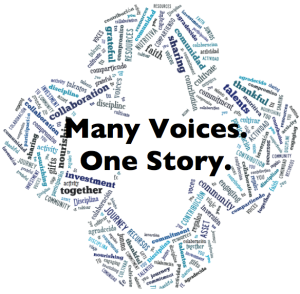
Sunday, October 6, 2013
Twentieth Sunday after Pentecost
Luke 17:5-10
Rev. Dr. Amy Butler
Sermon Audio
_____________________________
This morning we begin the first of four weeks in worship with the October emphasis of stewardship. In other words, this is the month we designate every year to focus in worship and in other places in our life together on our individual practices of discipleship.
I can sort of hear you groaning inside a bit: oh no, here we go, talking about money. And yes, we’ll talk about money some. October 27th is stewardship Sunday, where we’re formal about collecting pledge cards for financial giving in the year ahead. But as you know if you’ve been around any length of time, we talk about giving all the time here—our money, our time, our intention and energy. That’s called discipleship: the brass tacks of what it means to follow Jesus.
The Calvary stewardship team has been working since May to plan these four Sundays and complementary events around the theme, “Many Voices, One Story.” Reflecting the rich diversity of the family of God, we recognize the unique perspectives and stories of faith we each bring to Christian discipleship and we affirm again the story of Jesus the Christ, who calls us from our own individual experiences to join our hearts and voices and hands together with others to live that audaciously radical story Jesus came to teach us: loving God, and loving our neighbors.
Guiding our exploration of stewardship, of discipleship, in the weeks ahead are four stories from the Gospel of Luke. They are stories about the substance of discipleship—what it takes to follow Jesus with our whole lives. And they were stories told by Jesus himself, who used stories all the time to make his point to the people who followed him. So, think of it this way: our exploration of what it means to be a disciple in these coming weeks is framed by the theme, “Many Voices, One Story.” And we’re using Jesus’ stories, that is: “Many Stories, One Voice.” Weird, huh?
Well, we’re nothing if not weird.
We start this morning with a little passage from the Gospel of Luke, chapter 17. It might help you to think about this passage if you look at the actual text, so if you will please grab those black pew Bibles and turn to page 853.
Did you know there are about 450 different printed translations of the Bible in English? Yeah, often folks don’t realize that. All those different versions come because there are disagreements about how to translate parts of the text, or translators are trying to present the text in a different way, or translators have a certain bias they’re trying to impose on the text. We have in our pews and usually read from the pulpit the New Revised Standard Version of the Bible, which is pretty dependable in terms of translation. But you may have another translation you like to use. For me personally, I usually use the New Revised Standard Version when I’m studying, but most mornings in my car on the way in to church I listen to a nice British woman read Eugene Peterson’s paraphrase of the biblical text, The Message. I find it helps me to hear the text rather than just reading it myself. In every printed translation I’ve seen and even the recorded versions I’ve heard, though, there’s always inflection and tone missing. In other words, there’s no translation of the Bible that says things like, “Jesus rolled his eyes and sighed deeply before responding,” or “, he said in a low, husky voice.” You know, things like that. Because it’s one thing to read the words; it would have added layers of understanding and meaning to what we read if we could only hear the tone and inflection!
This is particularly true in certain passages where, even with the filters of thousands of years and many languages from the original language of the text, we can tell that something is going on with tone. And this is particularly true when Jesus speaks, because I’m fairly sure Jesus was rarely, if ever, the sweet, soft, gentle man with flowing blond hair who spoke kindly and calmly all the time. I’d bet Jesus was much more blunt, grating, even…very direct in the way he spoke. And I think exactly that is what’s happening in today’s passage where Jesus and the disciples are talking about faith.
First of all, to try to understand this interchange we need to look at two things. The first is the context of the entire gospel of Luke, where it’s always the outcasts—the most unlikely ones—who have the most faith. You’d think it would be the disciples, the people who followed Jesus around all the time and listening to him 24/7. But in Luke’s gospel the people Jesus affirms for their faith are people like prostitutes, beggars, Samaritans, sick people, Roman soldiers…always the people on the outside—not the members of the club or the ones who have the most education or the people with the titles in front of their names. Luke’s gospel is all about faith in unlikely places. The second thing we need to know to get the meaning of this text is its immediate context. In the beginning of chapter 17 he tells the disciples that a life of following him is going to involve forgiving people who don’t deserve to be forgiven…and watching out for others before yourself…and showing care not to mislead people or misuse your positions of authority. It sounds like Jesus is just going down his list of what it means to be a faithful disciple…
…and the disciples, sitting there all around him, started glancing sideways at each other and looking at each other questioningly, shrugging their shoulders like, “What the heck?”, then they interrupt Jesus and say something like: “Whoa, slow down, slow down. Seriously? Have you met us? We’re not holy enough for that! You’re going to have to give us superpowers or something if you expect us to live up to those standards!”
See how different that sounds than: “The apostles said to the Lord, “Increase our faith!”
And the case is made for the New Revised Snarky Version of the Bible.
Remember that the people in Luke’s gospel who get it—who have the faith that Jesus is describing here—are NOT the disciples. The people who get it are, rather, outcasts, outsiders. Of all people, the disciples should have understood. But, yet again, they miss the boat and now it’s Jesus’ turn to respond with what I imagine was some strong inflection we don’t get from reading just the words. I think I’m going to go with frustration, perhaps tinged with a bit of sarcasm. “How many times do I have to tell you? Being faithful disciples is not about acquiring superhuman powers. It’s not about being super holy, about achieving nirvana, or about being born the Dalai Lama. In fact, you could have faith the size of a mustard seed—a really, really tiny bit—and still do really big, huge things. Saying that you need more faith before you can be my disciples is a cop out, true and simple.”
Have you ever seen a mustard seed? It’s really little. I myself have seen a mustard seed, because I was the really nerdy president of the church youth group in high school, and at the end of my term the youth minister presented me with a necklace that was all the rage in nerdy conservative Christian teenage girl land—that is, a mustard seed necklace.
What? You’ve never seen a mustard seed necklace?
I lost track of that beloved necklace somewhere along my journey, otherwise you know I’d be wearing it today. It was a tiny little seed set in a clear acrylic ball and put on a chain. I can’t recall exactly what wearing that necklace meant, but I expect it was something like the disciples. I need more faith. I need God to send a lightening bolt to magically make me into what a president of the youth group really should be: a super spiritual young woman who faithfully had her 30 minute devotional time every morning, who was kind and loving to everyone around her, who never smoked, drank, or used profanity, who was the paragon of virtue leading everyone she knew to faith in Jesus Christ. She was the kind of person who would say she would pray for you, then she would, and then what you wanted would happen.
That’s who I hoped I could become, if I could just have more faith. And that’s who the disciples wanted to be, too. They just couldn’t see it from where they sat. The things Jesus was asking them to do were too unbelievable, too hard. They could never be that faithful. And, by the way, neither could I.
Which is why me and my mustard seed necklace should have paid better attention to what Jesus said next, because it seems unrelated but it actually couldn’t be more related. Being a disciple, Jesus was trying to communicate, isn’t about collecting a huge amount of faith, of being super holier than everybody around you.
It about just doing the next right thing.
Jesus talked about slaves, a common strata of society in Jesus’ day, not spending their time imagining that they were not slaves, but instead just doing their jobs. They came in from working in the fields and dinner needed to be served. So they washed their hands and served dinner. And when it was over, they cleaned up. And the next day they got up and started again. They did their jobs.
Now, we could take issue with Jesus talking about slaves like this—he should have been saying that slavery was wrong! Yes, we could. But then we’d be missing the point. Jesus was answering the disciples’s complaint that they didn’t have enough faith to do what was being asked of them by saying: having faith is being faithful. That’s all. Whatever is next, whatever is right in front of you, whatever you have to do, do it. That’s what being a faithful disciple means.
This has been a hard week in our town. Almost every single one of our lives has been directly affected by the actions of Congress, actions we cannot control. The anxiety and fear caused by these circumstances is sure to make us wonder if we have enough faith to keep living lives of giving and gratitude, of discipleship and commitment. Feeling vulnerable and scared makes us instinctively close in on ourselves, pull back, feel sure that we don’t have the faith it’s going to take to do the big, scary stuff: to be super Christians, and love everybody, and fix all the problems of the world.
Congress shuts the government down and people set themselves on fire, a young mother is shot in front of the Capitol. I have hard decisions to make and I can’t see the future. I’m worried about people I love and I’m scared about what’s up around the corner.
“Increase my faith!,” I want to shake my fist at the sky and yell. I can’t do it!
Jesus would say (in a soft, gentle voice, as he brushed his blond hair out of his blue eyes):
When it seems too hard, do it anyway.
When you’re scared, keep going.
When there’s not enough light to see the path ahead, step forward into whatever little light you can see.
Being a disciple of Jesus doesn’t take magical powers; it’s not for people way more spiritual than you or I are; and it’s not just for people with mustard seed necklaces.
It’s for people like you and me, people who are scared, unsure, fear-filled doubters who somehow find the guts to just keep doing the right thing, over and over, one little faithful step at a time.
That’s all.
Amen.

